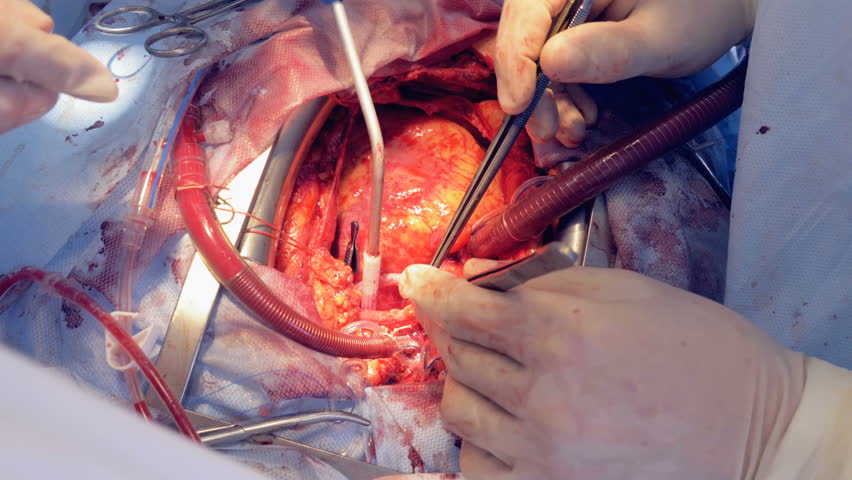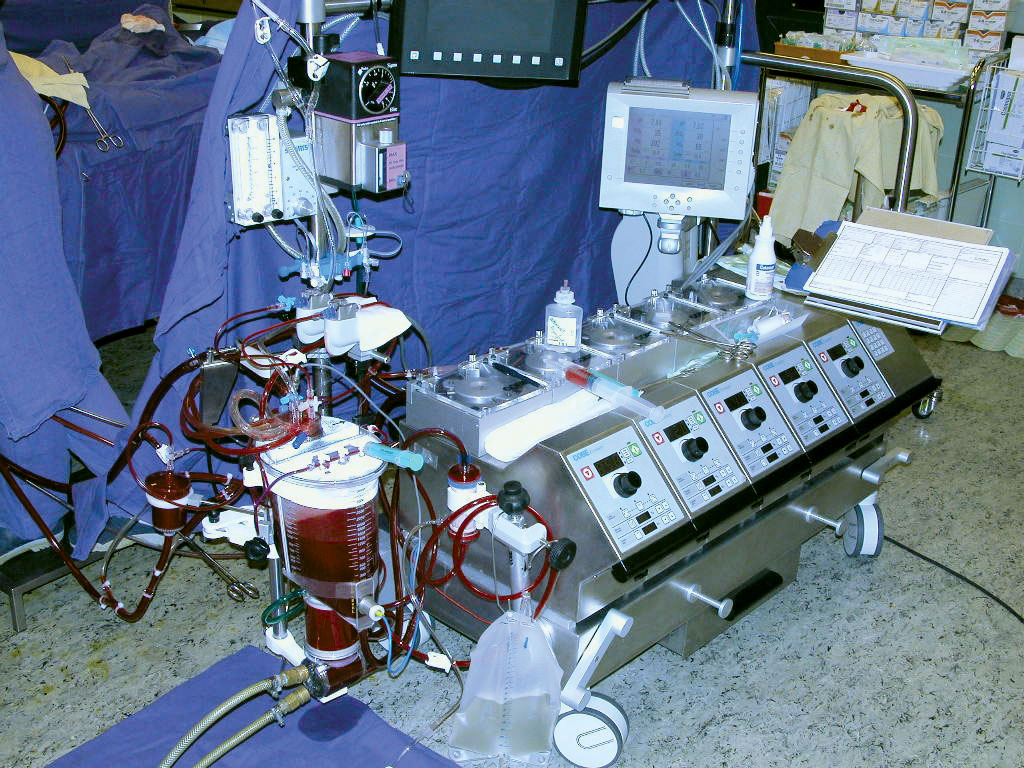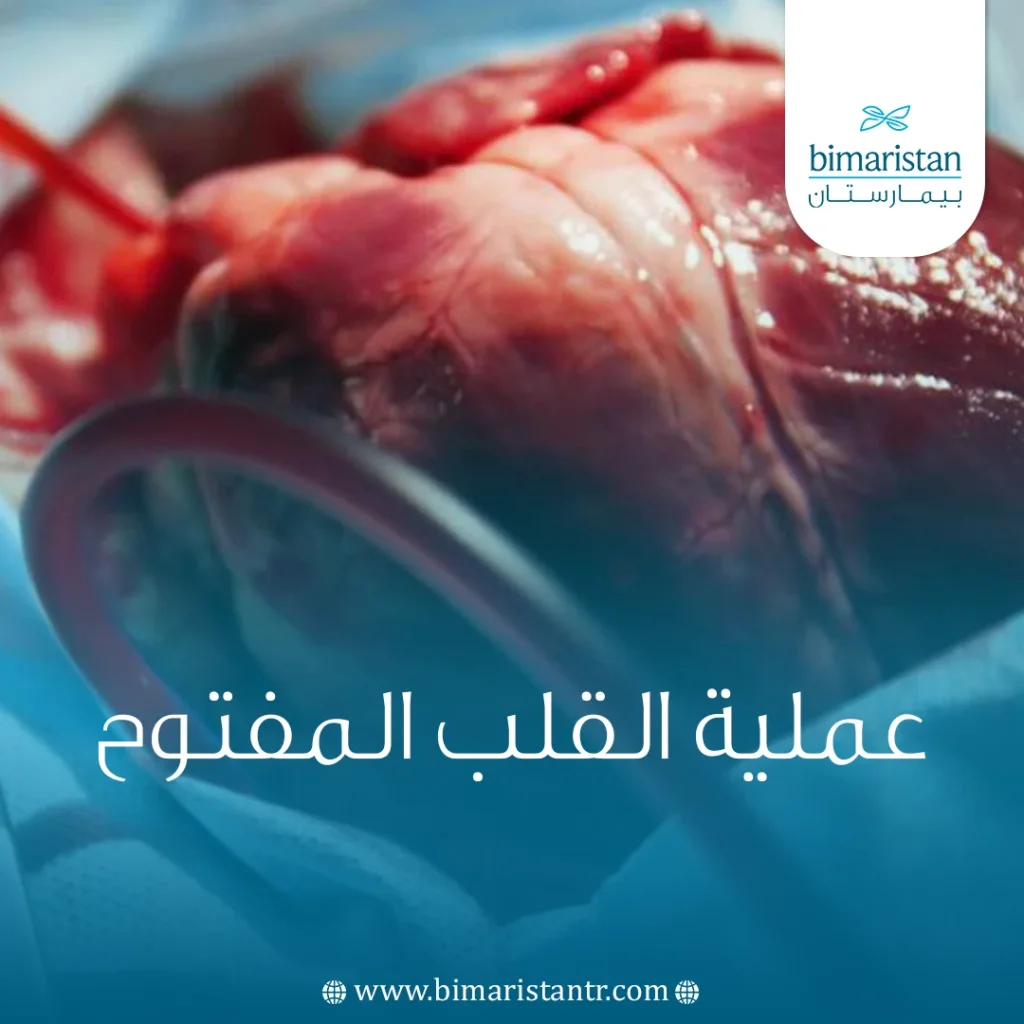عملية القلب المفتوح من العمليات الرائدة في مجال الطب لتصحيح خطأ أو أذية في القلب أو شرايينه، يمكنك الآن إجراء هذه العملية في تركيا على يد أمهر الأطباء المختصين.

لمحة عن عملية القلب المفتوح
جراحة القلب المفتوح هي عملية جراحية يتم إجراؤها على عضلات القلب أو صماماته أو شرايينه أو الشرايين المتصلة به.
إن مصطلح “عمليّة القلب المفتوح open heart surgery” يعني أن المريض يوضع على جهاز يدعى جهاز المجازة القلبية الرئوية heart-lung bypass machine أثناء العملية.
يتم إيقاف القلب وإيصال المريض بهذا الجهاز الذي يؤدي دور القلب والرئة في ضخ الدم وتزويده بالأوكسجين وتنقيته من ثاني أوكسيد الكربون طول فترة الجراحة.

تعتبر عمليات القلب المفتوح شائعة جداً، وقد أجريت ملايين المرات حول العالم، ونسبة الوفيات خلال 30 يوم بعد إجراء العملية لا تتجاوز 5%.
وقد أظهرت دراسة أن نسبة الوفيات الناتجة عن هذه العملية تقدر بحوالي 2.6% عند المرضى ذوي الخطورة المنخفضة، ومعظم هذه الوفيات يمكن تجنبها.
كما أظهرت النتائج أن نسبة البقيا بعد عمليات القلب المفتوح تقدر بحوالي 90% بعد 5 سنوات و74% بعد 10 سنين وهي نسبة مرتفعة.
أنواع عملية القلب المفتوح
هناك العديد من العمليات التي تتطلب فتح الصدر والوصول مباشرة إلى القلب والأوعية الدموية المحيطة.
وفيما يلي بعض العمليات التي يمكن إجراؤها أثناء جراحة القلب المفتوح:
- مجازة الشريان التاجي coronary artery bypass graft (CABG) لعلاج أمراض الشرايين التاجيّة (السبب الأشيع)
- إصلاح أو استبدال صمامات القلب لعلاج أمراض القلب الصمامية
- علاج الأجزاء المتضررة أو الشاذة من القلب
- زرع أجهزة طبية تساعد في الحفاظ على انتظام ضربات القلب
- نقل القلب أو زراعة القلب الصناعي لعلاج مرضى الفشل القلبي
- إصلاح أمهات الدم (تمدد الأوعية الدموية)
- إصلاح عيوب القلب الولادية كرباعي فالوت
في بعض الأحيان يقوم الجراحون أثناء عملية القلب المفتوح بوضع ناظمات خُطا أو أجهزة مزيلة لرجفان القلب قابلة للزرع (ICDs) أو اجراء الجذ ablation لعلاج اللانظمية القلبية.
طرق إجراء عملية القلب المفتوح
هناك طريقتين لإجراء عمليات القلب المفتوح في تركيا كما هو موضح بالفيديو:
عملية القلب المفتوح باستخدام المضخة
وتسمى أيضاً عملية القلب التقليدية، يتم فيها وصل القلب إلى جهاز المجازة القلبية الرئوية والذي يؤدي دور القلب والرئتين في المحافظة على دوران الدم، ثم يتم فصل القلب الذي توقف فيه النبض وتُجرى العملية على القلب أو الشرايين الإكليلية، وبعد الجراحة يقوم الجراح بفصل الجهاز عن القلب ويبدأ القلب بالنبض من جديد.

عملية القلب المفتوح بدون مضخة
وفيها يستمر القلب بالنبض بدون جهاز المجازة القلبية الرئوية خلال فترة الجراحة، إذ إن هنالك تقنيات جديدة تسمح بتثبيت جزء من القلب بدلاً من إيقافه كلياً، تعمل هذه الطريقة فقط على عملية المجازة الشريانية التاجية بدون مضخة، وتستخدم للمرضى الذين يعانون اختلاطات تمنعهم من استخدام جهاز المجازة القلبية الرئوية لإجراء هذه العملية.

مخاطر عملية القلب المفتوح
إن مخاطر حدوث اختلاطات لعملية القلب المفتوح ستزداد إذا كان المريض يعاني من مشاكل صحية أخرى مثل السكري أو البدانة أو المشاكل الرئوية كالداء الرئوي الانسدادي المزمن، وفيما يلي بعض مضاعفات عملية القلب المفتوح:
- رد فعل تحسسي تجاه المخدر
- اللانظمية القلبية (عدم انتظام ضربات القلب)
- أذية الأوعية الدموية أو الأعضاء المجاورة كالرئة أو القلب
- الفشل الكلوي الحاد
- النزف
- تشكل خثرات دموية
- زلة تنفسية
- ذات رئة
- إنتان مكان العملية
- السكتة الدماغية
- فقدان الذاكرة (أكثر شيوعاً عند المرضى فوق 65 عاماً)
- فشل قلب المتبرع (إذا أجرى المريض عملية زراعة قلب)
- الموت (خصوصاً عند المرضى ذوي الخطورة العالية قبل إجراء العملية)
التحضيرات قبل عملية القلب المفتوح
قبل إجراء جراحة قلب مفتوح يجب على المريض اتباع تعليمات الطبيب للتقليل من مخاطر العملية قدر المستطاع:
- التوقف عن التدخين واستهلاك الكحول بأسرع وقت ممكن
- إخبار الطبيب بجميع الأدوية التي يتناولها، سيقوم الطبيب بإيقاف بعض الأدوية قبل العملية مثل مميعات الدم
- البدء باستخدام صابون خاص مضاد للبكتيريا قبل عدة أيام من العملية
- تجنب مضغ أو تناول أو شرب أي شيء بعد منتصف الليلة ما قبل العملية
وعند القدوم إلى المشفى سيقوم المريض بإجراء بعض الفحوص الروتينية كصورة الصدر البسيطة وتخطيط القلب الكهربائي بالإضافة إلى الاختبارات الدموية.
قبل البدء بالعملية سيتم حلاقة صدر المريض وتعقيم منطقة الجراحة بصابون خاص قاتل للبكتيريا وتأمين خط وريدي لإعطاء السوائل والأدوية للمريض أثناء العملية.
طريقة إجراء عملية القلب المفتوح
إن عملية القلب المفتوح عملية معقدة تستغرق حوالي 3-6 ساعات على يد فريق متخصص بالجراحة القلبية،يتم فيها وضع المريض تحت التخدير العام للتأكد من أنه لن يشعر بالألم وسيظل نائماً طوال فترة العملية.
يقوم الجراح بإجراء شق جراحي على الخط الناصف بطول 8-10 إنش (20-25 سم) في الصدر خلال عظم القص أو جزء منه حتى يصبح القلب مكشوفاً.
عندما يصبح القلب مرئياً يتم وصله إلى جهاز المجازة القلبية الرئوية، ويقوم طبيب التخدير بإعطاء المريض دواء عبر الوريد لإيقاف نبض القلب (بعض العمليات لا تتطلب ذلك كما ذكرنا).
يقوم الجراح بإجراء العملية المطلوبة على عضلة القلب أو أحد صماماته أو شرايينه الإكليلية أو الأبهر.
ثم يقوم الجراح بفصل المريض عن الجهاز للسماح بعودة التدفق عبر القلب فيعود النبض تلقائياً أو عبر صدمة كهربائية بسيطة.
بعد عودة النبض تتم خياطة عظم القص بأسلاك صغيرة وإغلاق الشق الجراحي.
بعد عملية القلب المفتوح
بعد إجراء الجراحة في المستشفى في تركيا سيتم نقل المريض إلى وحدة العناية المشددة ICU ليبقى فيها لمدة يوم أو أكثر حسب سبب العملية، ثم يُنقل إلى غرفة عادية في المستشفى ليبقى فيها عدة أيام.
سيكون المريض موضوعاً على جهاز لمراقبة النبض والضغط والتنفس وباقي العلامات الحيوية.
كما يتم إجراء التنبيب الرغامي لمساعدة المريض على التنفس بعد العملية إلى أن يصبح قادراً على التنفس بمفرده بعد بضع ساعات من العملية.
نصائح بعد عملية القلب المفتوح
إن اعتناء المريض بصحته في المنزل بعد العملية مباشرة أمر ضروري للشفاء.
على المريض إبقاء الجرح دافئاً وجافاً وأن يغسل يديه قبل وبعد لمس الجرح، إذا كان الجرح بحالة جيدة يمكن الاستحمام بالماء الدافئ لمدة لا تتجاوز عشر دقائق وبدون رش الماء بقوة على الجرح.
من العلامات التي تدل على التهاب الجرح النز أو التسريب من الجرح والاحمرار حول الجرح وارتفاع الحرارة الموضعية والحمى.
من المهم كذلك أن يتناول المريض مسكنات الألم كما وصفها الطبيب لكي يتعافى بشكل أسرع وينقص من خطر حدوث الاختلاطات مثل تشكل الخثرات أو الإصابة بذات الرئة.
قد يعاني المريض من صعوبات في النوم بعد عملية القلب المفتوح ولكن من الضروري أن ينال قسطاً كافياً من الراحة ويعود إلى النوم المنتظم الذي كان عليه قبل العملية قدر المستطاع.
كما يمكن للمريض الاستفادة من برنامج إعادة تأهيل القلب للمساعدة على استعادة القوة والقدرة على التحمل وتحسين صحة القلب بشكل عام، وهذا يتم بحضور عدة جلسات أسبوعياً تتضمن أداء تمارين رياضية والتقليل من عوامل الخطورة والتعامل مع التوتر والقلق والاكتئاب.
بعد إجراء عملية القلب المفتوح لمريض الشرايين التاجية يجب معرفة أن العملية لا تمنع الشرايين التاجية من الانسداد من جديد، ومن المهم أن يعتني هؤلاء المرضى بصحتهم من خلال:
- الحفاظ على حمية غذائية صحية
- الامتناع عن تناول الطعام الغني بالملح أو الدسم أو السكر
- ممارسة الرياضة بانتظام والبدء بنمط حياة أكثر نشاطاً وحيوية
- التوقف عن التدخين
- الحفاظ دوماً على ضغط الدم ونسبة الكولسترول ضمن الحدود الطبيعية
يجب على المريض التواصل مع طبيبه مباشرة إذا واجه أيا من المشاكل التالية:
- ألم صدري (وليس مجرد انزعاج مكان الجرح)
- حمى
- غثيان أو إقياء
- ضيق نفس
- أحد علامات التهاب جرح العملية
النتائج بعيدة المدى لعملية القلب المفتوح في تركيا
سيكون الشفاء تدريجياً وتختلف مدة الشفاء حسب سبب العملية والاختلاطات بعد العملية والحالة الصحية العامة للمريض قبل إجراء العملية.
سيستغرق الأمر حتى ستة أسابيع لتشعر بالتحسن وستة أشهر لتشعر بالنتيجة المرجوة من العملية.
سيحدد الجراح موعد عودة المريض للعمل والبدء بأداء النشاطات المختلفة، عادة يجب عدم قيادة السيارة أو حمل أي شيء ثقيل لأول ستة أسابيع بعد العملية.
المظهر الخارجي سيكون جيداً بالنسبة لمعظم الأشخاص والمجازات المستخدمة يمكنها العمل لعدة سنوات.
قد يحتاج بعض الأشخاص لتناول مميعات الدم بعد إجراء عملية القلب المفتوح لتجنب تشكل الخثرات الدموية.
لماذا أختار العلاج في تركيا؟
في الآونة الأخيرة أصبحت تركيا من الدول الرائدة في مجال السياحة العلاجية على مستوى العالم.
يعود السبب وراء ذلك إلى وجود مراكز طبية مُتطورة توفّر العلاج المناسب على يد أمهر الأطباء وأحدث الأجهزة الطبية وبتكلفة قليلة.
ويبقى مركز بيمارستان الطبي هو خيارك الأول للعلاج في تركيا.
نرشدك لأفضل الأخصّائيين الخبراء بكافة الأقسام.
نسهّل لغة التواصل بينك وبين الجميع عن طريق أطباء عرب متخصصين سيساعدونك في التواصل مع طبيبك.
نساعدك في تأمين العلاج المناسب والخدمة الراقية في أحدث المشافي والمراكز الطبية في تركيا.
نقدم خدماتنا على امتداد كبير وبشكل دقيق.
نرافقك خطوة بخطوة نحو الشفاء.
استشارات مجانية على مدار الساعة.
لا تتردد بالتواصل معنا، مركز بيمارستان عائلتك في تركيا.

